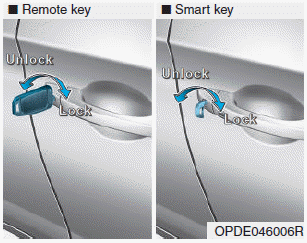Hyundai i-30: Trailer towing / Maintenance when towing a trailer
Your vehicle will need service more often when you regularly pull a trailer. Important items to pay particular attention to include engine oil, automatic transmission fluid, axle lubricant and cooling system fluid. Brake condition is another important item to frequently check. If you’re trailering, it’s a good idea to review these items before you start your trip. Don’t forget to also maintain your trailer and towbar. Follow the maintenance schedule that accompanied your trailer and check it periodically. Preferably, conduct the check at the start of each day’s driving. Most importantly, all towbar nuts and bolts should be tight.
NOTICE
To prevent vehicle damage:
- Due to higher load during trailer usage, overheating might occur on hot days or during uphill driving. If the coolant gauge indicates over-heating, switch off the air conditioner and stop the vehicle in a safe area to cool down the engine.
- Do not switch off the engine whilst the coolant gauge indicates over-heating. (Keep the engine idle to cool down the engine)
- When towing check automatic transmission fluid more frequently.
- If your vehicle is not equipped with an air conditioner, you should install a condenser fan to improve engine performance when towing a trailer.
 Driving with a trailer
Driving with a trailer
Towing a trailer requires a certain
amount of experience. Before setting
out for the open road, you must get
to know your trailer. Acquaint yourself
with the feel of handling and
braking with the added weight of the
trailer...
 Vehicle weight
Vehicle weight
Two labels on your driver’s door sill
show how much weight your vehicle
was designed to carry: the Tyre and
Loading Information Label and the
Certification Label...
Other information:
Hyundai i30 (PD) 2018-2025 Owner's Manual: Pre-tensioner seat belt
Your vehicle is equipped with driver's and front passenger's and rear passengers (if equipped) Pre-tensioner Seat Belts (Retractor Pretensioner). The purpose of the pre-tensioner is to make sure the seat belts fit tightly against the occupant's body in certain frontal or side collision(s)...
Hyundai i30 (PD) 2018-2025 Service Manual: Heater & A/C Control Unit (Manual)
Components and components location Components Connector [A] Pin NO Function Pin NO Function 1 Low 4 Middle Low 2 Common 5 Middle High 3 Ground 6 High Connector [B] Pin NO Function Pin NO Function 1 Battery (+) 21 IGN2 2 ISG B+ 22 IGN1 3 ILL+ (TAIL) 23 - 4 Sensor REF (+5V) 24 - 5 Mode actuator feedback 25 - 6 Temperature actuator feedback 26 - 7 Intake actuator feedback 27 MAX Blower ON Signal 8 EVAP Sensor (+) 28 PTC Relay 3 9 AMB Sensor (+) 29 PTC Relay 2 10 Mode actuator (Vent) 30 PTC on signal 11 Mode actuator (Defrost) 31 Detent OUT (-) 12 Temperature actuator (Cool) 32 - 13 Temperature actuator (Warm) 33 C_CAN High 14 Intake actuator (Fresh Air) 34 C_CAN Low 15 Intake actuator (Recirculated Air) 35 - 16 HTD (Rear defog indicator) 36 ECV + 17 Rear defog switch 37 ECV- (Ground) 18 - 38 Sensor ground 19 Blower ON signal to common 39 Ground 20 ILL- (RHEO) 40 Ground Repair procedures Replacement 1...
Categories
- Manuals Home
- 3rd Generation i30 Owners Manual
- 3rd Generation i30 Service Manual
- Theft-alarm system
- Exhaust System (DPF) Warning Light. Glow Indicator Light
- LKA system operation
- New on site
- Most important about car
Door locks
Operating door locks from outside the vehicle
Mechanical key

Turn the key toward the rear of the vehicle to unlock and toward the front of the vehicle to lock.
If you lock/unlock the driver's door with a key, a driver’s door will lock/unlock automatically.
